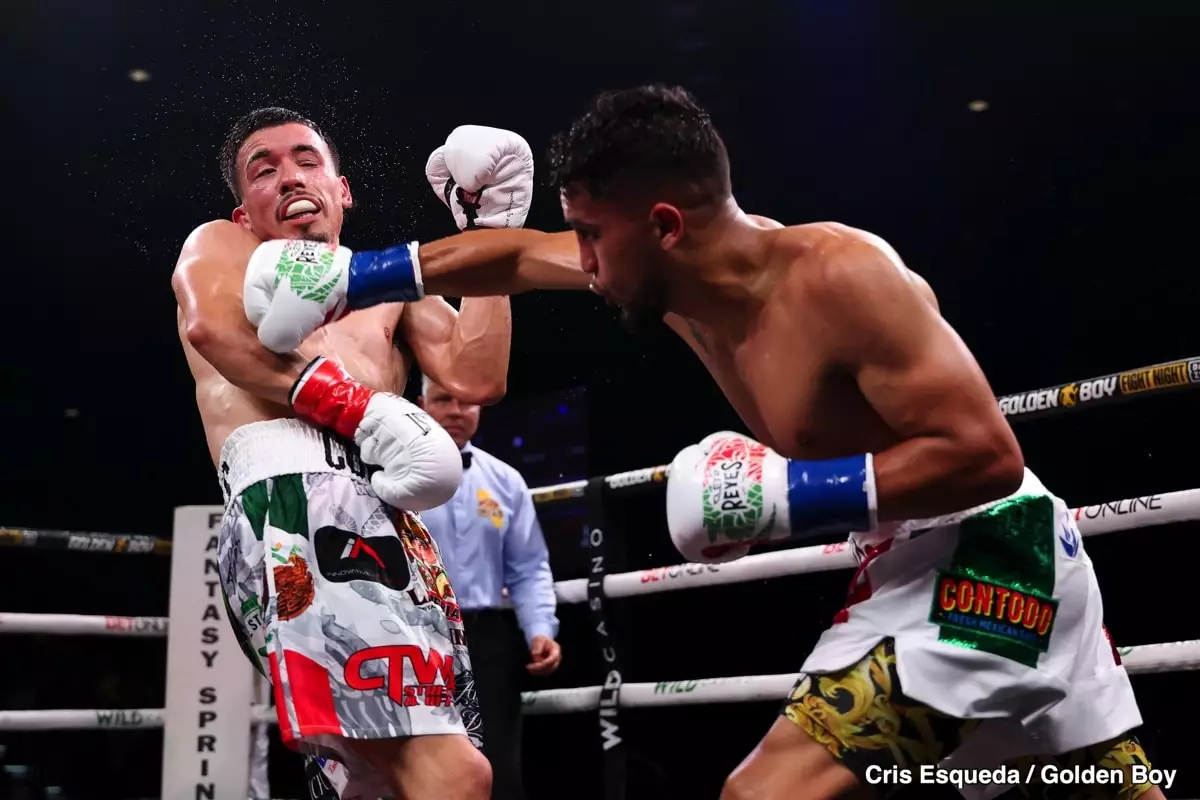In an electrifying atmosphere packed with eager fans, boxing once again demonstrated its capacity to deliver both excitement and disappointment. The main event, featuring Manuel “Gucci Manny” Flores and Jorge Chavez, epitomized how subjective scoring can mar the sport’s reputation. After ten grueling rounds of relentless aggression, precise counters, and strategic movement, the judges’ decision to declare a majority draw left many spectators puzzled and frustrated. Cards read 93-97, 95-95, and 95-95—results that starkly contrast with the intensity witnessed in the ring.
Chavez’s reaction encapsulated the collective sentiment of those watching: disbelief and anger. His assertion that the cut was caused by a headbutt rather than punches highlights the friction between fighters and officiating, but it also underscores a deeper issue—judicial bias or incompetence. When judges seem to shrug at a fight of such caliber, it questions the very foundation of fairness in boxing. Critics have long argued that the sport’s scoring system is flawed, often influenced by subjective interpretations rather than objective assessments. This fight amplified that concern, revealing the need for transparency and accountability among officials, especially in crucial bouts.
Furthermore, Chavez’s provocative declaration—calling out undefeated prospect Picasso as his next opponent—was a bold move that exemplifies fighters’ desire for respect and recognition. Meanwhile, Flores voiced a pragmatic but slightly disillusioned take: boxing is as much about attrition and intimidation as it is about finesse. His early respect for Chavez seemed misplaced, perhaps a sign of ring caution or strategic restraint that backfired in the eyes of fans eager for action. If only fighters and judges could agree on standards of scoring and aggression, perhaps more bouts would end definitively, leading to greater clarity and credibility.
The recurring theme here is the persistent disconnect between the fighters’ realities and the judges’ perceptions. Fighters stay on their toes, making split-second decisions, but the judging panel seems disengaged, perhaps distracted or indifferent. Would more stringent standards or technological aids like instant replay elevate the fairness? It’s a question worth pondering as boxing’s reputation continues to wander in grey areas. Fans yearn for battles that are told through clear, honest scores—not muddled by ambiguous decisions or benign indifference.
Underdogs Seize Opportunities and New Stars Emerge
While the main event stirred controversy, the undercard delivered its own compelling narratives of resilience and rising talent. Farid Ngoga’s victory over the ostensibly confident Jordan Panthen was a textbook case of an underestimated contender surpassing expectations. Ngoga’s calm, calculated boxing style confounded the flashy Hawaiian, who struggled to impose his power or style. The majority decision—97-93, 95-95, 96-94—served as both a validation for Ngoga’s strategic approach and a reminder that hype alone does not determine victory.
In another highlight, Cayden Griffiths continued his perfect start to his professional career without much fuss, dispatching David Ramirez with a punch that appeared instantly personal. His sixth consecutive knockout signals raw talent and potential that boxing insiders should watch. Similarly, Leonardo “Bazooka” Sanchez made a loud statement with a fourth-round KO over Abraham Valdez, exploding onto opponents with relentless power until the referee intervened—perhaps prematurely, but leaving no doubt about Sanchez’s burgeoning reputation.
The fights telling a different story were Grant Flores’s quick TKO over Todd Manuel and Fabian Guzman’s decisive decision against Brian Arregui. Flores’s body-shot barrage showcased impressive power and composure; Guzman’s clean sweep in the judges’ scorecards restored some faith in boxing’s ability to produce fair outcomes. His victory underlines how, despite the chaos at the top of the night, good boxing practices still reign supreme in lower-stakes fights.
Meanwhile, the undercard prelims offered a sobering reminder of boxing’s often pedestrian side— Bryan Lua and Kevin Piedrahita battling to a draw in a result that felt more like a procedural formality than a showcase of talent. It was an uninspired back-and-forth that left spectators with a shrug rather than excitement. Only Javier Meza managed to bring order, convincingly beating Cesar Villarraga in a straightforward six-rounder that lacked controversy but delivered clarity and professionalism.
The Night’s True Lesson: A Culture of Respect and Preparedness Is Needed
This night in boxing, filled with unpredictable outcomes, highlighted both the sport’s raw excitement and its systemic flaws. The contested main event underscored how crucial judging reforms are if we desire a sport rooted in merit and fairness. Every fight is a story of perseverance, strategy, and resilience, but when the sheets of paper—the scorecards—tell a different story, fans are left disillusioned.
Moreover, the emergence of new talents like Ngoga and Griffiths serve as a reminder that boxing continues to evolve, with fighters hungry for recognition and victory. These fighters, untainted by controversy and committed to their craft, embody the sport’s best qualities. Yet, their accomplishments are sometimes overshadowed by the chaos at the top, where politics, questionable officiating, and complacency sometimes tarnish the sport’s integrity.
If boxing aims to elevate itself beyond a spectacle of questionable decisions and inconsistent officiating, it must embrace modernization—be it through better training, transparent judging, or technological aids. Fans and fighters alike deserve a sport where their efforts are judged fairly, their victories celebrated honestly, and their disappointments acknowledged transparently. Until then, boxing’s journey remains one of grit, controversy, and endless potential for growth.


Leave a Reply